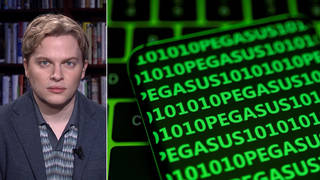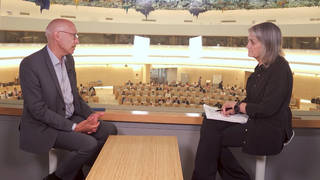
The Justice Department announced late last month that it would not bring any federal charges against the suburban Philadelphia public school system that monitored students by remotely activating the cameras on computer laptops issued to its students. While the school system will face no criminal charges, two civil lawsuits filed by students are proceeding. [includes rush transcript]
Transcript
JUAN GONZALEZ: We turn now to an update on another story involving student privacy that we’ve been following. The Justice Department announced late last month that it would not bring any federal charges against the suburban Philadelphia public school system that monitored students by remotely activating the cameras on computer laptops issued to them. School officials at the Lower Merion School District have claimed they were simply trying to recover missing or stolen computers. But evidence has emerged indicating the monitoring system was misused. One student, Blake Robbins, was photographed over 400 times during a fifteen-day period last year, sometimes as he slept or as he was half-dressed at home.
AMY GOODMAN: According to court documents, one employee of the school system commented in an email that viewing the webcam pictures and screen shots from a student’s computer was like watching a little soap opera. Another school employee responded by writing, quote, “I know, I love it.” While the school system will face no criminal charges, two civil lawsuits filed by students are proceeding.
We’re joined in Philadelphia by Mary Catherine Roper, who’s a staff attorney with the ACLU in Pennsylvania.
So, what happened in this case?
MARY CATHERINE ROPER: Well, this is a classic case of a government surveillance system being put into position for one purpose and then turning into something completely different, which, unfortunately, is what we find with government uses of tracking technology. So, the Lower Merion School District, when they started this one laptop per student program, wanted to make sure that they’d have a way of finding the laptops if they were lost or stolen. And so they put in this tracking software that did a number of things. When turned on, it would transmit back to the school any IP address where it was being used. Also it would turn on the camera and take pictures of whatever was around the laptop at that moment, a picture, I think, every fifteen minutes.
The third thing it would do, which has not been talked about as much in the press, but is actually perhaps the scariest thing, is that it would take a screen shot. So whatever that student was doing — IMing, emailing, looking at things on the web, on the internet — that would be captured, again, at fifteen-minute intervals for as long as the system was turned on. And it was turned on when laptops were in fact missing, stolen or just lost, and then, it seems, inadvertently not turned off after their recovery. But that only explains some of the instances. There are a number of instances where it’s clear that the monitoring was turned on not to look for a missing or stolen laptop, for reasons that sometimes we don’t know yet.
JUAN GONZALEZ: Well, Mary Catherine Roper, after this was revealed, the district has now attempted to put in new safeguards, but it’s still continuing with the program? Is that accurate? And could you talk about what safeguards they are — they have initiated?
MARY CATHERINE ROPER: Yeah. This new system or the new safeguards are something that was developed in very close work with not only Blake Robbins’s attorneys, but also with the ACLU. They still have the laptop program. That is, students still have the laptops. But now they have very clear rules about the use of any tracking software. It does not permit the capture of images at any time for any reason. They may adopt some new kind of tracking software, such as GPS chips or something like that, so that if laptops do in fact go astray, they can be found in a manner that doesn’t reveal anything about their use by the students.
AMY GOODMAN: I mean, explain. How do they say they were just tracking the laptops, when you had the case of the young man that we were just talking about, Blake Robbins? Wasn’t he called into the principal’s office because they thought he was using drugs, because they took pictures of him, while he didn’t know they were taking pictures of him, in his bedroom through the laptop camera, when he — well, he had this horrible habit of eating Mike’s and Ike’s candy — or is it Ike’s and Mike’s, I’m not sure — and they were saying he was popping drugs?
MARY CATHERINE ROPER: Well, I can’t comment on those allegations, because I’m not his attorney and I haven’t reviewed that evidence, but it’s very clear that they turned on the monitoring on Blake Robbins’s computer, not because it was reported lost or stolen, because it hadn’t been, but quite possibly because he had a computer that he was not supposed to take off campus. The program required parents to pay a modest insurance fee to cover any cost if the laptop was lost or stolen. And if a parent didn’t want to pay the fee, that’s fine. The kids still got to use the computer, but had to leave it at school. It seems there were a number of instances where the laptop monitoring device was turned on to see whether students were complying with that limitation. As I understand it, that is the reason that has been given for the monitoring of Blake Robbins. I am still talking to parents about several other cases where there was no such reason. The laptop wasn’t lost. It wasn’t stolen. They had paid their insurance fee. And yet, their students were monitored. And in each circumstance, we’re really wondering what was going on there.
AMY GOODMAN: Well, Mary Catherine Roper, we want to thank you very much for being with us, staff attorney at the ACLU in Pennsylvania.












Media Options